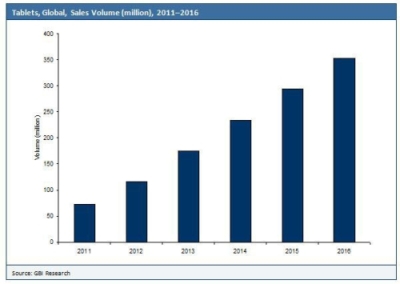Oct 5 2012
The growth of the Light Emitting Diode (LED) and LED driver Integrated Circuit (IC) markets in the Asia-Pacific region is attributed to the large number of manufacturing plants in the region's countries, including China, Taiwan and Korea.
It is also attributed to the increasing demand for energy-efficient displays and lighting solutions in applications such as Liquid Crystal Display (LCD) TV backlights and hybrid cars. The LED and LED driver IC market in Asia-Pacific is expected to grow from 2012 to 2016 due to the reduction of costs and an increase in the consumption of LEDs for different applications in the region. The increasing use of portable devices such as tablets and smartphones in Asia-Pacific will contribute to the expected growth.
 LED and LED Driver IC Markets to Grow Further in Asia-Pacific. (PRNewsFoto/Global Information, Inc.)
LED and LED Driver IC Markets to Grow Further in Asia-Pacific. (PRNewsFoto/Global Information, Inc.)
LEDs in Horticultural Applications Creates Opportunities
The rising need for LEDs in horticultural applications, such as greenhouses, indoor gardening, research, and tissue culture, has huge potential to increase the overall LED market size. Some of the features of LEDs that promote plant growth are their small form factors, spectral composition control, high efficiency and long lifespan. These features influence plant morphology and ultimately boost productivity. LED lighting can also be used for other horticulture applications, including multilayer cultivation and interlighting.
Companies such as LumiGrow and Osram Opto Semiconductors are already involved in the design and development of long-lasting LEDs and energy-efficient LED bulbs and fixtures, which can be used for a range of agricultural and horticultural applications.
Implementation of Policies and Standards Increases Adoption of LEDs
With countries across the globe implementing phase-out policies, energy policies or Minimum Energy Performance Standards (MEPS), the adoption of LEDs is expected to increase. Several countries, including Australia, Brazil, China, Malaysia and South Africa, are involved in the phasing out of inefficient incandescent lights, which utilize more electricity. This will allow inefficient lights to be replaced with efficient lights such as LEDs, reducing the energy consumption in these countries. MEPS have been implemented in countries such as Nigeria and Canada to improve the competence of general lighting by eliminating the use of inefficient light bulbs. The adoption of LEDs is also expected to increase due to other government policies including labeling and certification programs, promotion policies, tax schemes and lighting programs.
Increasing Demand for Tablets Contributes to LED Market Growth
The LED market is expected to increase due to the growing demand for tablets across the world. In 2011, the global sales volume of tablets was 72.5 million units, and this is expected to increase at a Compound Annual Growth Rate (CAGR) of 24.8% from 2012 to 2016. The tablets' requirements, such as high efficiency, long battery life, consistent brightness and lack of flicker during dimming, are met by LEDs. Thus, the demand for highly efficient LEDs in the tablet market is expected to increase.
Lack of Quality Checks and Labels Poses a Challenge
The lack of quality checks and labels for LED lighting products is one of the major challenges for the LED market. This has lead to slow acceptance of LED products in the market. To overcome this, government institutions around the world are working to develop schemes and incentives to promote their use. There is an urgent need for the industry to implement schemes so that poor-quality products from manufacturers can be avoided. There is also a need for governments to develop independent testing laboratories to ensure products' quality. Thus, government bodies and leading industry players must proactively work towards enforcing quality checks and labeling programs.